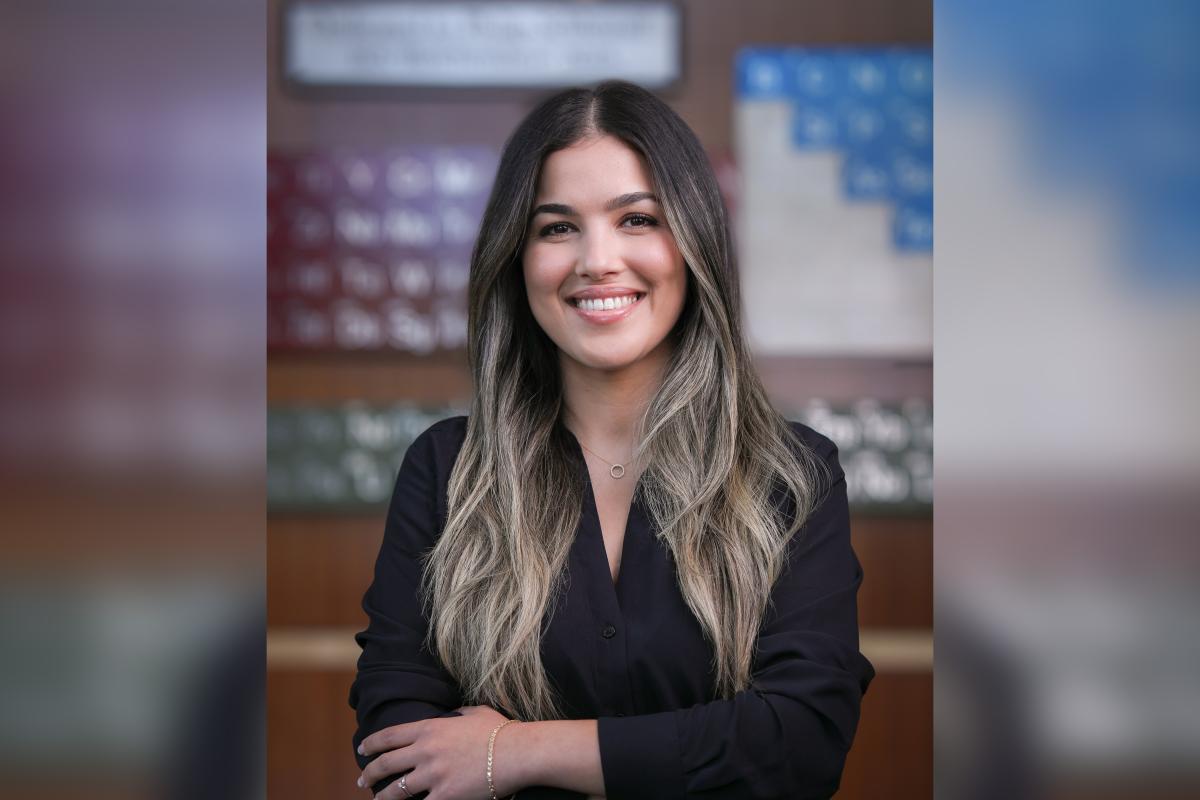Alumni Spotlight: Azza Ben Akacha

Azza Ben Akacha earned a doctorate in materials chemistry in Fall 2023 from FSU’s Department of Chemistry and Biochemistry, part of the College of Arts and Sciences. Her research interests lie in designing hybrid materials, such as perovskites and organic metal halide hybrids for potential applications in electronic devices. During her time as a graduate student, Ben Akacha served as a member of the FSU Graduate Symposium Planning Committee, a board member for Graduate Women in STEM, and a mentor for the FSU Young Scholars Program and FSU Florida Georgia Louis Stokes Alliance for Minority Participation (FSU-FGLSAMP).
Tell us little bit about your background, where you're from and what brought you to FSU.
I’m from Tunisia, a small country in North Africa. There are not many Tunisians at FSU, so coming here was a bit challenging and out of my comfort zone. The FSU chemistry department is renowned for its great professors and their scientific contributions, and the research areas here are vast. Especially for materials chemistry, there are many research groups working on different aspects within the field.
What inspired you to pursue a degree in materials chemistry?
Back home, I earned a master’s degree in solid-state chemistry, so I studied crystals. I was amazed by how crystals are packed and ordered at the atomic level. It felt like being an architect. Materials are also present in every aspect of our life and shape our everyday experience, so I see a lot of importance in my work. Particularly, I love the research process of starting with an idea or concept, designing experiments, and finally drawing conclusions.
Can you walk us through your research interests within this field?
I mostly design hybrid materials, specifically, ionically bonded crystals which are made of organic cations and inorganic anions positively and negatively charged components, respectively. Then, I focus on the study of the structural and optical properties of these crystals. In the Ma Group, under professor of chemistry Biwu Ma, we’re primarily interested in investigating the photophysical properties of hybrid materials and their applications in electronic devices like LEDs and solar cells, and also in X-ray imaging. I am researching how chemical modifications in the crystal components customize its optical properties. Consequently, this change in properties will influence their potential applications. Recently, in our research group we are interested in the application of our materials in spintronic devices thanks to this compositional control.
What do you want the public to know about your research? Why are your topics important?
I am designing new functional hybrid materials with desirable optical properties. For instance, I developed chiral white photoluminescent crystals with enhanced stability for use in different instances such as white LED devices and spintronics. My research is also multidisciplinary, so it’s great to see how we collaborate with different departments within and outside of FSU. It's very interesting to collaborate with physicists and theoretical chemists to gain a better understanding of our materials and explore their new applications.
What's something people don't really know about studying a discipline in the STEM field?
Creativity is very important in STEM, and it will make you stand out as a scientist. In STEM research, creativity is demonstrated through your capability to generate new ideas, to explore new collaborations and to make great presentations.
What on-campus resources helped you achieve success?
I'm grateful for the shared laboratories in the chemistry department, where we have shared instruments that every graduate student can use after training. For my research, the X-ray Crystallography Center and the Materials Characterization Laboratory are very important in enabling me to achieve success, as well as FSU Libraries to access research literature.
What are some current goals or projects that you're working on?
I graduated in Fall 2023 and I'm currently looking for a job.
Are there any faculty or staff who helped or inspired you?
I owe my success to my principal investigator, Professor Ma and his valuable mentorship. I am thankful for his financial support during my doctoral program. I'd like to mention the Mass Spectrometry Laboratory and the X-ray Crystallography Center director, Xinsong Lin, as well. I thank him for his enthusiasm with my materials as well as his guidance and collaboration during the past five years of my program.
Now that you've graduated, what do you miss about FSU?
I definitely miss FSU. At this university, I was able to mature scientifically and personally because of the different activities that I participated in on campus. I'm looking forward to joining the work force and making use of my knowledge and expertise to serve the community and face new challenges in life. I’d like to stay connected and give back to FSU students, as well. I’m very interested in engaging in the ProfessioNole Mentors Program.
What advice do you have for current graduate and undergraduate students?
For graduate students, my advice is to focus on your research and be active in organizations. Many opportunities will come your way when you are meeting new people from different fields. For instance, I initiated a collaboration with my friend Tianhan Liu, (now a postdoctoral scholar at University of California, Los Angeles) from the FSU Department of Physics. who was a GWIS board member like me. I advise graduate students to concentrate on their specific research projects and to actively seek ways to broaden their knowledge and connections.
For undergrads, my advice is to enjoy basic STEM courses such as chemistry, math, and biology because that will build your skillset, which is very important if you want to attend grad school. Participate in research programs offered by FSU even if you don't know what you want to pursue later. The experience of doing research in a lab will help you shape your interests and know what you really want to pursue.
